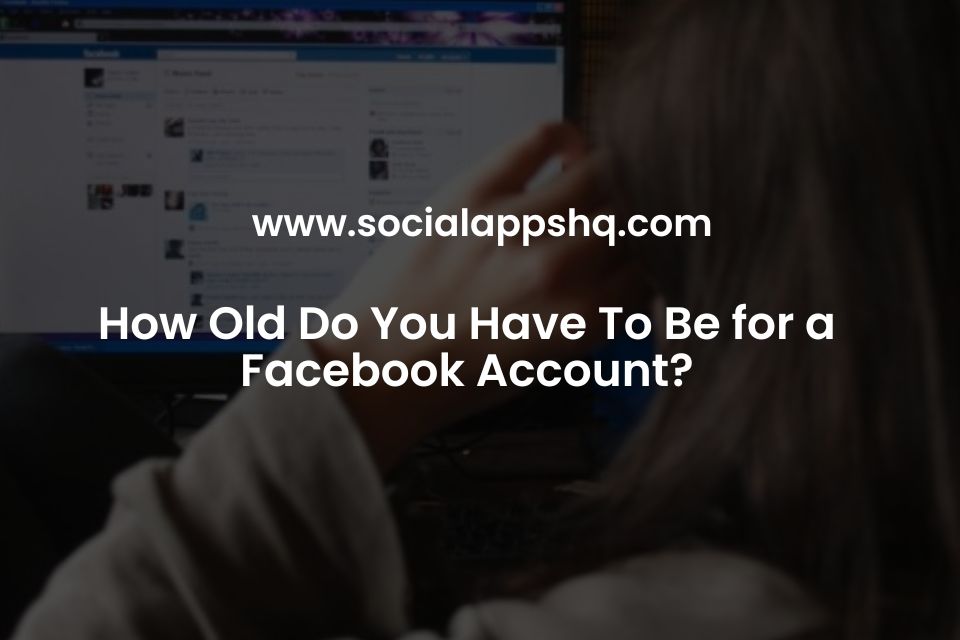Let’s talk about something that’s been on everyone’s mind lately—how old do you have to be for a Facebook account? It’s not just a random question; it’s an important one. Facebook has become more than just a social platform; it’s where people connect, share, and even conduct business. But before you jump in, there are rules—and age is a big part of it. So, let’s dive right into the nitty-gritty of Facebook’s age policies and why they matter.
Now, you might be wondering why there’s even an age limit for something as simple as creating a profile. Well, buckle up because this isn’t just about keeping kids off social media. It’s about protecting them from potential harm, ensuring privacy, and complying with legal regulations. Stick with me, and I’ll break it all down for you in a way that’s easy to digest.
Whether you’re a parent trying to set boundaries, a curious teen wanting to know the rules, or an educator looking for insights, this article’s got you covered. We’ll explore everything from Facebook’s official stance to the reasons behind these age restrictions and what happens if someone tries to bypass them. Let’s get started!
Understanding Facebook’s Official Age Requirement
Alright, let’s get straight to the point. Facebook’s official policy states that you need to be at least 13 years old to create an account. Yep, you heard that right—13 is the magic number. But why 13? Well, it’s not just some random figure Facebook pulled out of thin air. It’s actually tied to a U.S. law called the Children’s Online Privacy Protection Act (COPPA). This law requires websites and apps to get parental consent before collecting data from kids under 13. So, Facebook decided it was easier to just set the bar at 13 and avoid the hassle.
Why Is 13 the Minimum Age?
Here’s the deal: Facebook isn’t the only platform with this rule. Most social media sites have the same minimum age because of COPPA and similar laws around the world. These laws are designed to protect kids from things like data breaches, cyberbullying, and inappropriate content. By setting the age limit at 13, Facebook aims to create a safer environment for its users.
Now, some people might argue that 13 is still too young, and others might think it’s too old. But the truth is, it’s a compromise between legal requirements and practicality. Facebook wants to strike a balance between accessibility and safety, and 13 seems to be the sweet spot.
The Legal Side of Facebook’s Age Policy
Let’s talk about the legal elephant in the room. Facebook’s age requirement isn’t just a company policy—it’s backed by law. The COPPA regulation I mentioned earlier is a big deal. It gives parents control over what information websites can collect from their kids. If Facebook allowed users under 13, they’d have to deal with a ton of red tape, including getting parental consent for every single account. That’s a lot of paperwork, and let’s be honest, nobody wants that.
But here’s the kicker: even with these laws in place, some kids still try to bypass the rules. They either lie about their age or get help from older siblings or friends. While it might seem harmless, it can lead to serious consequences. We’ll dive deeper into that later, but for now, just know that Facebook takes these age restrictions seriously.
Global Regulations and Facebook’s Compliance
It’s not just the U.S. where Facebook has to play by the rules. Many countries have their own regulations when it comes to online privacy and child protection. For example, the European Union’s General Data Protection Regulation (GDPR) also sets a minimum age of 13 for social media platforms. So, Facebook has to comply with these laws wherever it operates.
Now, some countries might have stricter rules, and Facebook adjusts its policies accordingly. For instance, in certain regions, the minimum age might be higher than 13. It all depends on the local laws and regulations. Facebook’s legal team works hard to ensure compliance, so they don’t run into trouble.
What Happens If You’re Under 13 and Try to Join?
Let’s say you’re 12 and really want a Facebook account. You decide to lie about your age and create one anyway. What’s the worst that could happen, right? Well, here’s the thing: Facebook has systems in place to detect fake accounts. If they find out you’re under 13, they’ll deactivate your account faster than you can say “selfie.”
But it’s not just about losing your account. There are bigger risks involved. By lying about your age, you’re exposing yourself to potential dangers like cyberbullying, phishing scams, and inappropriate content. Facebook’s age restrictions are there for a reason, and bypassing them can have serious consequences.
Facebook’s Detection Mechanisms
Facebook uses a combination of algorithms and user reports to identify underage accounts. If someone reports an account for being fake or underage, Facebook investigates. If they find evidence that the account belongs to someone under 13, they’ll shut it down. It’s not just about enforcing rules; it’s about keeping the platform safe for everyone.
Now, some people might think they can outsmart Facebook’s system by using fake names or hiding their age. But trust me, it’s not worth the risk. Facebook’s detection mechanisms are pretty advanced, and they’re constantly improving. So, if you’re under 13, it’s better to wait until you’re old enough to join legally.
The Importance of Age Restrictions in Social Media
Let’s take a step back and think about why age restrictions are important in the first place. Social media platforms like Facebook are full of complex interactions, personal data, and potential risks. For kids under 13, navigating this world can be overwhelming and even dangerous. That’s why age restrictions are crucial—they help protect young users from harm.
But it’s not just about safety. Age restrictions also ensure that users have the maturity and understanding to use these platforms responsibly. At 13, most kids are old enough to grasp concepts like privacy, consent, and online etiquette. By setting the age limit at 13, Facebook is helping to create a more responsible and respectful online community.
Parental Involvement and Guidance
Now, let’s talk about the role of parents in all of this. If you’re a parent, you might be wondering how you can help your kids navigate the digital world safely. The first step is to have open and honest conversations about online safety. Teach them about the importance of privacy, the dangers of sharing personal information, and how to spot scams.
Secondly, consider setting up parental controls on devices and apps. This can help you monitor your kids’ online activity and ensure they’re using social media responsibly. And finally, be a good role model. Show your kids how to use social media in a positive and respectful way. After all, kids learn by example.
Alternatives for Kids Under 13
So, what can kids under 13 do if they’re not allowed on Facebook? Well, there are plenty of kid-friendly alternatives out there. Platforms like Messenger Kids, YouTube Kids, and Roblox offer safe and fun ways for kids to connect and interact online. These platforms are specifically designed for younger users and have features like parental controls and content filters to ensure safety.
Plus, there are tons of offline activities kids can enjoy while they wait to join Facebook. Encourage them to explore hobbies, sports, and creative pursuits. The world is full of amazing things to discover, and social media is just one small part of it.
Why Choose Kid-Friendly Platforms?
Kid-friendly platforms are designed with safety in mind. They have features like parental controls, content filters, and age-appropriate content. This makes them a great alternative for kids who aren’t ready for the full social media experience. Plus, they offer a more controlled environment where kids can learn and grow without being exposed to the risks of the adult world.
So, if you’re a parent or guardian, consider steering your kids toward these platforms. They’ll still get to enjoy the benefits of social interaction, but in a safer and more controlled way.
Common Myths About Facebook’s Age Policy
There are a lot of myths floating around about Facebook’s age policy. Some people think it’s just a suggestion, while others believe it’s only enforced in certain countries. Let’s debunk some of these myths and set the record straight.
- Myth 1: Facebook’s age policy is just a guideline. Nope! It’s a strict rule backed by law.
- Myth 2: Only U.S. users have to follow the age limit. Wrong! Facebook enforces the age policy globally.
- Myth 3: You can get away with lying about your age. Not true! Facebook’s detection systems are pretty effective at catching fake accounts.
These myths can lead to confusion and misinformation, so it’s important to know the facts. Facebook takes its age policy seriously, and so should you.
Why Busting Myths Matters
Busting myths is important because it helps people make informed decisions. If you believe the wrong information, you might put yourself or your kids at risk. By understanding the truth about Facebook’s age policy, you can make smarter choices about how and when to use the platform.
So, the next time you hear someone spreading a myth about Facebook’s age policy, don’t hesitate to set them straight. Knowledge is power, and in this case, it can help keep you and your loved ones safe.
How Facebook Enforces Its Age Policy
Now that we’ve talked about the rules, let’s talk about how Facebook enforces them. Facebook uses a combination of technology and human intervention to ensure compliance with its age policy. They have teams dedicated to monitoring accounts and investigating reports of underage users.
Here’s how it works: when someone creates a Facebook account, they’re asked to enter their date of birth. If the date indicates they’re under 13, the account is automatically flagged for review. Facebook may also use algorithms to detect suspicious activity, like multiple accounts created from the same IP address or unusual login patterns.
The Role of User Reports
User reports play a big role in Facebook’s enforcement efforts. If someone suspects an account belongs to an underage user, they can report it. Facebook then investigates the report and takes appropriate action if necessary. This collaborative approach helps keep the platform safe for everyone.
But here’s the thing: Facebook relies on users to report violations. If you see something suspicious, don’t hesitate to report it. It’s a simple way to contribute to a safer online community.
Conclusion: Why Age Matters on Facebook
So, there you have it—the lowdown on Facebook’s age policy and why it matters. From legal requirements to safety concerns, there are plenty of reasons why Facebook sets the minimum age at 13. It’s not just about following the rules; it’s about protecting users and creating a safer online environment.
As we’ve seen, bypassing these rules can lead to serious consequences. Not only can it result in account deactivation, but it can also expose users to potential dangers. So, if you’re under 13, it’s better to wait until you’re old enough to join legally.
And for parents and guardians, remember that your involvement is key. By setting boundaries, having open conversations, and encouraging safe online behavior, you can help your kids navigate the digital world responsibly.
So, what’s next? If you found this article helpful, feel free to share it with others. Knowledge is power, and the more people know about Facebook’s age policy, the safer the online world will be. And don’t forget to check out our other articles for more insights and tips on digital safety.
Table of Contents
- Understanding Facebook’s Official Age Requirement
- The Legal Side of Facebook’s Age Policy
- What Happens If You’re Under 13 and Try to Join?
- The Importance of Age Restrictions in Social Media
- Alternatives for Kids Under 13
- Common Myths About Facebook’s Age Policy
- How Facebook Enforces Its Age Policy
- Conclusion: Why Age Matters on Facebook


